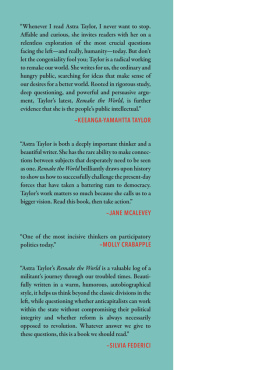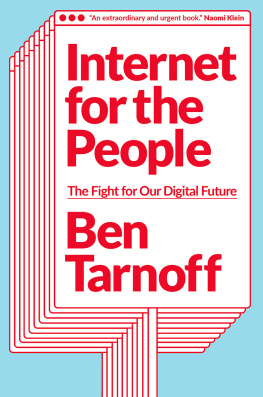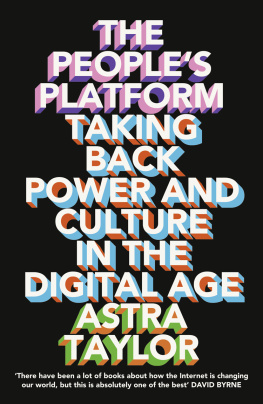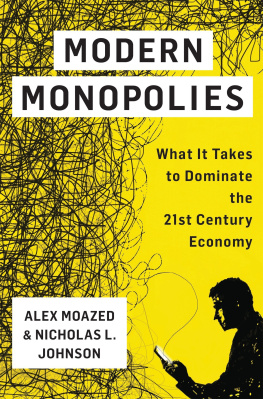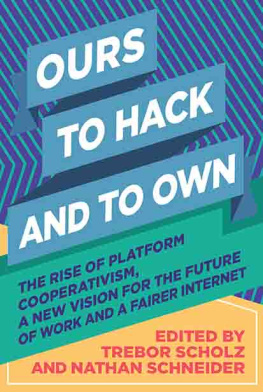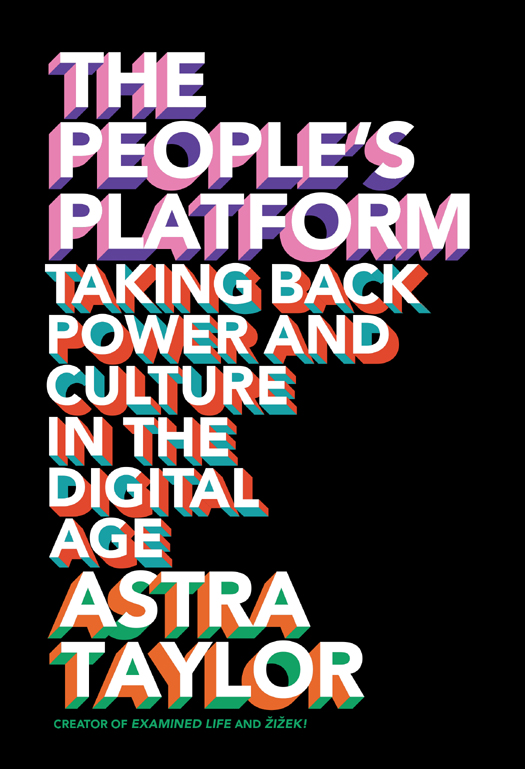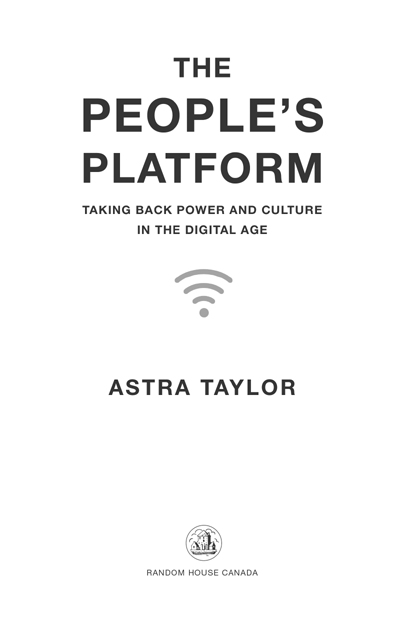Also by Astra Taylor
Examined Life: Excursions with Contemporary Thinkers
Occupy! Scenes from Occupied America (co-editor)
PUBLISHED BY RANDOM HOUSE CANADA
Copyright 2014 Astra Taylor
All rights reserved under International and Pan-American Copyright Conventions. No part of this book may be reproduced in any form or by any electronic or mechanical means, including information storage and retrieval systems, without permission in writing from the publisher, except by a reviewer, who may quote brief passages in a review. Published in 2014 by Random House Canada, a division of Random House of Canada Limited, Toronto, and also in the United States of America by Metropolitan Books, an imprint of Henry Holt and Company, LLC, a division of Macmillan Publishers, Ltd., New York, and in the United Kingdom by HarperCollins Publishers, Ltd., London. Distributed in Canada by Random House of Canada Limited.
www.randomhouse.ca
Random House Canada and colophon are registered trademarks.
Library and Archives Canada Cataloguing in Publication
Taylor, Astra, author
The peoples platform : taking back power and culture in the digital age / Astra Taylor.
ISBN 978-0-307-36034-2
eBook ISBN 978-0-307-36036-6
1. Virtual reality. 2. Equality. 3. InternetSocial aspects. I. Title.
HM851.T39 2014 303.4834 C2012-905611-1
Cover based on a design by Julian Humphries
v3.1
CONTENTS
PREFACE
When I was twelve years old, while most of my peers were playing outside, I hunkered down in my familys den, consumed by the project of making my own magazine. Obsessed with animal rights and environmentalism, I imagined my publication as a homemade corrective to corporate culture, a place where other kids could learn the truth that Saturday morning cartoons, big-budget movies, and advertisements for Happy Meals hid from them. I wrangled my friends into writing for it (I know its hard to believe I had any), used desktop publishing software to design it, and was thrilled that the father of one of my conspirators managed a local Kinkos, which meant we could make copies at a steep discount. Every couple of months my parents drove me to the handful of bookstores and food co-ops in Athens, Georgia, where I eagerly asked the proprietors if I could give them the latest issue, convinced that when enough young people read my cri de coeur the world would change.
It was a strange way to spend ones preadolescence. But equally strange, now, is to think of how much work I had to do to get it into readers hands once everything was written and edited. Thats how it went back in the early nineties: each precious copy could be accounted for, either given to a friend, handed out on a street corner, shelved at a local store, or mailed to the few dozen precious subscribers I managed to amass. And I, with access to a computer, a printer, and ample professional copiers, had it pretty easy compared to those who had walked a similar road just decades before me: a veteran political organizer told me how he and his friends had to sell blood in order to raise the funds to buy a mimeograph machine so they could make a newsletter in the early sixties.
When I was working on my magazine I had only vague inklings that the Internet even existed. Today any kid with a smartphone and a message has the potential to reach more people with the push of a button than I did during two years of self-publishing. New technologies have opened up previously unimaginable avenues for self-expression and exposure to information, and each passing year has only made it easier to spread the word.
In many respects, my adult work as an independent filmmaker has been motivated by the same concerns as my childhood hobby: frustration with the mainstream media. So many subjects I cared about were being ignored; so many worthwhile stories went uncovered. I picked up a camera to fill in the gap, producing various documentaries focused on social justice and directing two features about philosophy. On the side Ive written articles and essays for the independent press, covering topics including disability rights and alternative education. When Occupy Wall Street took off in the fall of 2011, I became one of the coeditors of a movement broadsheet called the Occupy! Gazette, five crowd-funded issues in total, which my cohorts and I gave away for free on the Web and in print.
Im a prime candidate, in other words, for cheering on the revolution that is purportedly being ushered in by the Internet. The digital transformation has been hailed as the great cultural leveler, putting the tools of creation and dissemination in everyones hands and wresting control from long-established institutions and actors. Due to its remarkable architecture, the Internet facilitates creativity and communication in unprecedented ways. Each of us is now our own broadcaster; we are no longer passive consumers but active producers. Unlike the one-way, top-down transmission of radio or television and even records and books, we finally have a medium through which everyones voice can supposedly be heard.
To all of this I shout an enthusiastic hurrah. Progressives like myself have spent decades decrying mass culture and denouncing big media. Since 1944, when Max Horkheimer and Theodor Adorno published their influential essay The Culture Industry: Enlightenment as Mass Deception, critics have sounded the alarm about powerful corporate interests distorting our culture and drowning out democracy in pursuit of profit.
But while heirs to this tradition continue to worry about commercialism and media consolidation, there is now a countervailing tendency to assume that the Internet, by revolutionizing our media system, has rendered such concerns moot. In a digital world, the number of channels is theoretically infinite, and no one can tell anyone what to consume. We are the ultimate deciders, fully in charge of our media destinies, choosing what to look at, actively seeking and clicking instead of having our consumption foisted upon us by a cabal of corporate executives.
As a consequence of the Internet, it is assumed that traditional gatekeepers will crumble and middlemen will wither. The new orthodoxy envisions the Web as a kind of Robin Hood, stealing audience and influence away from the big and giving to the small. Networked technologies will put professionals and amateurs on an even playing field, or even give the latter an advantage. Artists and writers will thrive without institutional backing, able to reach their audiences directly. A golden age of sharing and collaboration will be ushered in, modeled on Wikipedia and open source software.
In many wonderful ways this is the world we have been waiting for. So whats the catch? In some crucial respects the standard assumptions about the Internets inevitable effects have misled us. New technologies have undoubtedly removed barriers to entry, yet, as I will show, cultural democracy remains elusive. While its true that anyone with an Internet connection can speak online, that doesnt mean our megaphones blast our messages at the same volume. Online, some speak louder than others. There are the followed and the followers. As should be obvious to anyone with an e-mail account, the Internet, though open to all, is hardly an egalitarian or noncommercial paradise, even if you bracket all the porn and shopping sites.
To understand why the most idealistic predictions about how the Internet would transform cultural production and distribution, upending the balance of power in the process, have not come to pass, we need to look critically at the current state of our media system. Instead, we celebrate a rosy vision of what our new, networked tools theoretically make possible or the changes they will hypothetically unleash. Whats more, we need to look ahead and recognize the forces that are shaping the development and implementation of technologyeconomic forces in particular.


